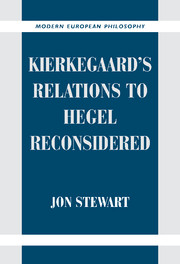Book contents
- Frontmatter
- Contents
- Acknowledgements
- Abbreviations of Primary Texts
- Preface
- Introduction
- 1 Kierkegaard and Danish Hegelianism
- 2 Traces of Hegel in From the Papers of One Still Living and the Early Works
- 3 The Ironic Thesis and Hegel's Presence in The Concept of Irony
- 4 Hegel's Aufhebung and Kierkegaard's Either/Or
- 5 Kierkegaard's Polemic with Martensen in Johannes Climacus, or De omnibus dubitandum est
- 6 Kierkegaard's Repetition and Hegel's Dialectical Mediation
- 7 Hegel's View of Moral Conscience and Kierkegaard's Interpretation of Abraham
- 8 Martensen's Doctrine of Immanence and Kierkegaard's Transcendence in the Philosophical Fragments
- 9 The Dispute with Adler in The Concept of Anxiety
- 10 The Polemic with Heiberg in Prefaces
- 11 Subjective and Objective Thinking: Hegel in the Concluding Unscientific Postscript
- 12 Adler's Confusions and the Results of Hegel's Philosophy
- 13 Kierkegaard's Phenomenology of Despair in The Sickness unto Death
- 14 Kierkegaard and the Development of Nineteenth-Century Continental Philosophy: Conclusions, Reflections, and Reevaluations
- Foreign Language Summaries
- Bibliographies
- Subject Index
- Index of Persons
Introduction
Published online by Cambridge University Press: 13 March 2010
- Frontmatter
- Contents
- Acknowledgements
- Abbreviations of Primary Texts
- Preface
- Introduction
- 1 Kierkegaard and Danish Hegelianism
- 2 Traces of Hegel in From the Papers of One Still Living and the Early Works
- 3 The Ironic Thesis and Hegel's Presence in The Concept of Irony
- 4 Hegel's Aufhebung and Kierkegaard's Either/Or
- 5 Kierkegaard's Polemic with Martensen in Johannes Climacus, or De omnibus dubitandum est
- 6 Kierkegaard's Repetition and Hegel's Dialectical Mediation
- 7 Hegel's View of Moral Conscience and Kierkegaard's Interpretation of Abraham
- 8 Martensen's Doctrine of Immanence and Kierkegaard's Transcendence in the Philosophical Fragments
- 9 The Dispute with Adler in The Concept of Anxiety
- 10 The Polemic with Heiberg in Prefaces
- 11 Subjective and Objective Thinking: Hegel in the Concluding Unscientific Postscript
- 12 Adler's Confusions and the Results of Hegel's Philosophy
- 13 Kierkegaard's Phenomenology of Despair in The Sickness unto Death
- 14 Kierkegaard and the Development of Nineteenth-Century Continental Philosophy: Conclusions, Reflections, and Reevaluations
- Foreign Language Summaries
- Bibliographies
- Subject Index
- Index of Persons
Summary
Although the research community in the English-speaking world has witnessed a new wave of interest in Kierkegaard's work over the last several years, the secondary literature has remained somewhat uneven, often treating him as a figure isolated from the intellectual tradition and context out of which his thought was born. Few of the major commentators do much to situate his thought vis-à-vis the tradition of German idealism which preceded him or the Danish philosophical milieu in which he was educated, and it is here that many issues and connections remain to be explored. One of the issues that has hitherto been treated most unevenly is the complex relation of Kierkegaard's philosophy to that of Hegel. The general importance of a study of this relation should be self-evident to any student of Kierkegaard's thought. References to Hegel occur throughout his literary corpus from his earliest works, and his contact with Hegelianism has often been seen as one of the most important dimensions of his biography and intellectual development. Many aspects of Kierkegaard's thinking, such as his conception of stages, his dialectical methodology, and his understanding of Socrates and Antigone, seem to recall key doctrines and analyses from Hegel's philosophy. While many scholars would agree that much of Kierkegaard's rich and diverse thought is best understood as being in a sort of dialogue with Hegel's philosophy, few have done much to establish the concrete points of contact in a historical fashion.
- Type
- Chapter
- Information
- Kierkegaard's Relations to Hegel Reconsidered , pp. 1 - 44Publisher: Cambridge University PressPrint publication year: 2003
- 1
- Cited by



